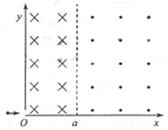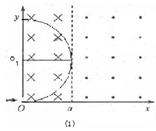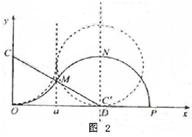问题
计算题
两屏幕荧光屏互相垂直放置,在两屏内分别去垂直于两屏交线的直线为x和y轴,交点O为原点,如图所示。在y>0,0<x<a的区域有垂直于纸面向内的匀强磁场,在y>0,x>a的区域有垂直于纸面向外的匀强磁场,两区域内的磁感应强度大小均为B。在O点出有一小孔,一束质量为m、带电量为q(q>0)的粒子沿x周经小孔射入磁场,最后打在竖直和水平荧光屏上,使荧光屏发亮。入射粒子的速度可取从零到某一最大值之间的各种数值。已知速度最大的粒子在0<x<a的区域中运动的时间与在x>a的区域中运动的时间之比为2︰5,在磁场中运动的总时间为7T/12,其中T为该粒子在磁感应强度为B的匀强磁场中做圆周运动的周期。试求两个荧光屏上亮线的范围(不计重力的影响)。
答案

对于y轴上的光屏亮线范围的临界条件如图1所示:带电粒子的轨迹和x=a相切,此时r=a,y轴上的最高点为y="2r=2a " ;

对于 x轴上光屏亮线范围的临界条件如图2所示:左边界的极限情况还是和x=a相切,此刻,带电粒子在右边的轨迹是个圆,由几何知识得到在x轴上的坐标为x=2a;速度最大的粒子是如图2中的实线,又两段圆弧组成,圆心分别是c和c’ 由对称性得到 c’在 x轴上,设在左右两部分磁场中运动时间分别为t1和t2,满足



解得
 由数学关系得到:
由数学关系得到:

代入数据得到:
所以在x 轴上的范围是
